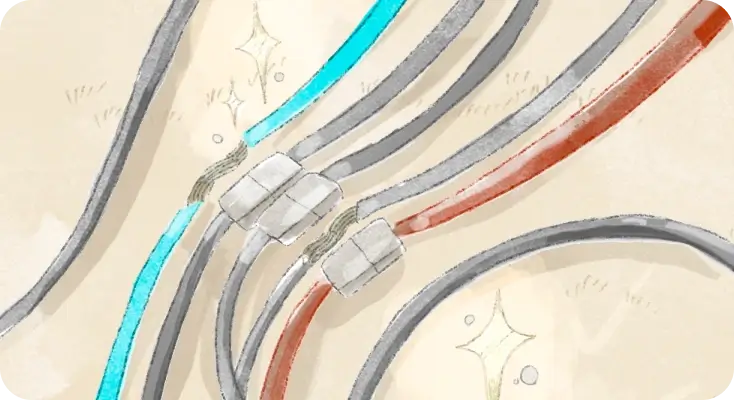TL;DR
- ADHD is a mental health condition that can make it difficult for people to be productive. This can stem from symptoms such as hyperactivity, impulsivity, lack of focus, etc.
- People with ADHD may feel stuck or frustrated on tasks, which can make them seem “lazy.” However, they might put effort into something while the disorder’s symptoms interfere, making it hard to stay on track despite their best intentions.
- Laziness, on the other hand, is often a choice. A person may decide not to do something or simply opt for an easier route.
- In some cases, people experience a lack of motivation due to external stressors or other mental health conditions, like depression or anxiety, rather than ADHD or laziness.
ADHD vs. laziness
“Why do you always leave everything till the last minute?” — Ben was so irritated that he started talking to himself.
“Why couldn’t you do these assignments 2 weeks ago? Is it even possible to finish them overnight?” — This was the third time this semester he faced such a situation.
“Is it my laziness or maybe… ADHD?” — Ben stopped for a second and started googling. He opened the first article, hoping to find out.
But wait. Has he already forgotten about the assignments themselves?
“Am I lazy, or do I have ADHD?” is a common question many people might deal with. Let’s learn the difference between these two phenomena to better understand.
Attention-deficit/hyperactivity disorder (ADHD) is a mental health condition that stems mostly from biological factors. People living with it tend to experience hyperactivity, impulsivity, lack of focus, and other symptoms they can’t control.
Those living with ADHD may have “lazy days,” similar to neurotypical people. However, they also might want to do something and put an effort into completing tasks. Still, problems with focus, time management, and executive functioning can make it feel difficult.
Laziness, on the other hand, is a decision. Imagine someone who needs to wash dishes, finish a report, or clean the house, but they don’t do it because they don’t feel like it.
Would they feel guilty about choosing to watch Netflix all day instead of working? Probably not.
But ADHD is not laziness — it’s not about choosing to avoid tasks. People with ADHD often want to get things done but feel stuck or frustrated. It’s not a lack of effort but a real struggle to start or finish tasks, even when they really want to.
ADHD paralysis vs. laziness
Quite often, people confuse ADHD paralysis and just being lazy.
However, ADHD paralysis isn’t about lack of motivation — it’s when someone feels mentally stuck, unable to begin or continue, even when they want to. The brain feels overloaded, making simple tasks seem impossible to start.
ADHD can also make people feel anxious or nervous. In the middle of doing something, the emotions can be so overwhelming, and the effort to focus is so intense that it becomes incredibly hard to finish without leaving tasks halfway done.
ADHD and laziness quick comparison
| Factors | ADHD | Laziness |
| Main symptoms | Difficulty focusing, impulsivity, hyperactivity, disorganization, and forgetfulness | Putting off tasks or procrastinating, even when they can do them |
| Cause | Biological factors including genetics, brain structure, and neurotransmitter imbalances | Psychological reasons like lack of motivation or just not caring about the task |
| Attention span | A person can hyperfixate on some tasks and get easily distracted by others. | A person can focus on tasks when interested or motivated. |
| Energy level | Often changes, with bursts of energy followed by periods of ADHD burnout | Tends to stay the same or change based on outside factors |
| Need for stimulation | People often crave stimulation and may seek constant activity or multitasking. | There’s no need for external stimulation, and people prefer low-effort activities. |
So, what’s the main difference between ADHD vs. laziness?
“Being lazy” or not doing something is about an active choice. You may leave the task hanging purposefully and decide not to return to it.
Experiencing ADHD is a completely different thing. You can’t decide to be hyperfixated or have ADHD paralysis, but these symptoms might make it challenging for you to stay on track.
As a result, people with ADHD can feel guilty or frustrated about not finishing tasks, while laziness doesn’t come with the same level of internal struggle or emotional weight.
I have no motivation to do anything. Can it be ADHD?
It might be ADHD, laziness, or something else. Everything highly depends on other symptoms you experience.
Have you seen the BoJack Horseman animated series? If yes, you remember the main character, who often appears unmotivated and lazy, avoiding responsibilities and procrastinating on important tasks.
While BoJack might seem lazy at first sight, his lack of motivation seems to stem from ADHD. Why? The character has problems with focus, impulsivity, hyperfixation, and emotional regulation, which are the key signs of ADHD.
Still, we can’t diagnose a fictional character, and neither the creators nor mental health professionals have confirmed this interpretation. It’s just an example to illustrate how people can mistake ADHD and unwillingness to do something.
Signs that it may be ADHD not just laziness
“How can I understand that I live with attention-deficit disorder?” — you may ask.
Well, the only possible way to know for sure is to get examined by a licensed therapist or other mental health professional. So, if you think you might have ADHD, it’s essential to contact your healthcare provider.
But what if you’re unsure? There are some signs that your lack of motivation may be due to ADHD.
Short attention span and distractibility
Do you feel like your attention slips away like sand through your fingers? How long has this been happening?
While it’s OK to get distracted when we’re sleepy, tired, or bored, if you lose concentration easily all the time, it might be a warning sign.
“Finally, the weekend! Time to sort out my wardrobe — no more keeping stuff I haven’t worn in years!” Ten minutes later, you find yourself scrolling through TikTok, with piles of clothes scattered all over the room.
That’s it! The difference between ADHD and laziness is that with attention-deficit disorder, you may be super-motivated but still unconsciously shift your attention all the time.
Impulsivity
Emotional outbursts that are hard to control and hasty decisions might also be signs of attention-deficit disorder.
When comparing feeling lazy vs. ADHD, lazy people usually avoid tasks by choice without feeling the intense pull to act impulsively. In contrast, someone with ADHD might rush into distractions without meaning, driven by an inability to pause and think things through.
Here are some other examples of impulsivity in ADHD.
- Interrupting someone mid-sentence before they have finished their thoughts
- Shouting out answers before the question is fully asked
- Diving headfirst into risky adventures without considering the consequences
- Getting irritated in long lines or during slow, drawn-out activities
- Jumping into big decisions without thinking them through (hello, impulse shopping!)
- Overreacting to small frustrations
Of course, this behavior can’t be a diagnostic criterion for ADHD. However, combined with other factors, it may be a sign.

Emotional dysregulation
“I feel like my ADHD is an excuse; I’m just lazy.”
If you live with ADHD or suspect you are experiencing its symptoms, you might have thought something like this. However, it’s essential to remember that an attention-deficit iceberg has a lot of hidden layers.
Here’s what a Reddit user says about experiencing emotional dysregulation.
“I’m so sick of experiencing so many emotions so intensely… I’m sick of being stuck in an anger spiral for a week, interspersed with manic hyperactive highs for a few minutes to maybe an hour.
I’m sick of being either so happy and loving my life only for it to turn into depression in the evening, not wanting to exist anymore.”
In some cases, ADHD symptoms, particularly emotional dysregulation, may be overwhelming and make it almost impossible to work effectively.
Time blindness
Am I lazy, or is it ADHD? Time blindness is one more noticeable symptom that helps understand the difference.
You’ve promised to write 7 work emails, prepare a report, and create a presentation for tomorrow’s meeting until lunchtime. But it’s already 5 p.m., and you’re still doing a report. You’ll probably need to stay overnight to create a presentation.
Certainly, sometimes, all of us may misjudge task timing. But how often does this happen to you?
“Do I have ADHD, or am I just lazy?”
You might try to take on more tasks but can’t handle them because you set unrealistic deadlines. If you face severe problems with time blindness regularly, it may signal the symptoms of the disorder.
Next time, you’ll look for the answer, “Am I lazy, or do I have ADHD?” it may be helpful to think about when it started.
If you experience a lack of motivation and trouble focusing from childhood, there’s a possibility that ADHD could be a factor. Still, if it started later in life, the reason may be different.
Does ADHD make you lazy?
“Can ADHD cause laziness?” We asked Viviana Greco, PhD, about it, “ADHD does not cause laziness, but it can lead to behaviors that may be perceived as laziness, such as procrastination, difficulty starting or completing tasks, challenges with focus and organization. However, these challenges are related to the neurobiological features of ADHD, including issues with impulse control, time management, and emotional regulation.”
This mental health condition can lead to behaviors like procrastination, getting distracted, or having trouble starting and finishing tasks. These may resemble laziness, but the peculiarities of the ADHD brain may cause them.
What are those? Let’s quickly find out.
- ADHD brain structure. People with attention-deficit/hyperactivity disorder think like neurotypical ones. Besides, some areas of their brains might have developed slower in their early years or remained smaller in adulthood.
For instance, the prefrontal cortex, responsible for planning, decision-making, and self-control, tends to be smaller or less active in people with ADHD. This can make it harder for them to stay organized, manage time, and resist impulsive actions.
- ADHD brain chemistry. Can ADHD make you lazy? No, but the dopamine-seeking nature of the ADHD brain can make it harder for people to engage in tedious tasks or stick to a routine.
Lower levels of norepinephrine and serotonin can also cause “laziness.” These can make it harder to feel motivated or energized, making everyday tasks that seem dull even more difficult to handle.

Markers that lack of motivation don’t stem from ADHD
So, we’ve analyzed the main signs that might show that your “laziness” is a symptom of ADHD. But what if it isn’t?
Feeling frustrated, unmotivated, or stuck can come from many other places. Let’s overview the main ones.
Stress
“How do I handle these health problems?… Stop, I need to do the report… Medical tests are so expensive. And who will stay with the children if something happens to me?”
Racing thoughts can distract you even if the task — like a work report — is super-important. You might question yourself, “Do I have ADHD, or am I lazy?” However, procrastinating because of overwhelming emotions may also happen among neurotypical people.
Burnout
You’ve been stressed for too long and now just don’t want to do anything. Is it laziness? Definitely, no!
Videos about emotional burnout are racking up millions of views on TikTok, and it’s no surprise — burnout can drain your energy and motivation, leaving you feeling like a shell of your former self.
It’s crucial to see burnout for what it is — a clear sign that your mind and body need a break. It’s not laziness but rather a signal that you need to recharge.
Lack of interest
Can you be lazy and have ADHD? Yes, you can. But maybe the problem is different.
If you often question yourself, “Why am I so lazy and unmotivated?” think about whether you really like what you’re doing. Of course, there might be things that you need to do. But if all your life consists of “needs” without any “wants,” there’s nothing to spark your passion or drive.
Poor nutrition and sleep
Let’s remember Shaggy Rogers from the Scooby-Doo animated series. He often feels low on energy, especially when he hasn’t slept enough or has eaten junk food. Pretty much as real people are!
Next time you think, “Is it ADHD, or am I being lazy?” it may be helpful to review your habits. Consider how much rest you’re getting and what you’re fueling your body with. Maybe the reason hides here.
Am I lazy, or do I have ADHD? What if it’s a sign of another mental health condition?
Sometimes, what we think is ADHD might be something else. Many conditions share similar symptoms, so digging deeper is important to understand what’s happening.
Anxiety can make you restless, depression often drains people’s energy, and for bipolar disorder, impulsivity is also typical.
Check out the most common mental health conditions that you may not consider when asking yourself, “Does ADHD make me lazy?”
- Depression
- Anxiety disorders
- Bipolar disorder
- Obsessive-compulsive disorder (OCD)
- Post-traumatic stress disorder (PTSD)
- Autism spectrum disorder (ASD)
- Chronic fatigue syndrome (CFS)
So, if you’re unsure when thinking, “Am I lazy or depressed?” or “Is ADHD a reason for being lazy?” it might be better to reach out to your healthcare provider. They can help you figure out what’s really going on and guide you toward the right treatment or support.
“Besides going to therapy, what would you recommend to people who face a lack of motivation (whether they are neurotypical or neurodiverse)?” Viviana Greco, PhD, comments:
Breaking down tasks into smaller, manageable steps and setting clear, achievable goals is essential for those struggling with motivation.
Other useful tips to help stay on track are:
- Establishing a structured routine and utilizing external tools, such as planners, apps, or accountability partners;
- Creating a productive environment by removing distractions, like phones, and decluttering the workspace;
- Prioritizing sleep, proper nutrition, and mindfulness techniques.
Disclaimer
This article is for general informative and self-discovery purposes only. It should not replace expert guidance from professionals.
Any action you take in response to the information in this article, whether directly or indirectly, is solely your responsibility and is done at your own risk. Breeze content team and its mental health experts disclaim any liability, loss, or risk, personal, professional, or otherwise, which may result from the use and/or application of any content.
Always consult your doctor or other certified health practitioner with any medical questions or concerns
Breeze articles exclusively cite trusted sources, such as academic research institutions and medical associations, including research and studies from PubMed, ResearchGate, or similar databases. Examine our subject-matter editors and editorial process to see how we verify facts and maintain the accuracy, reliability, and trustworthiness of our material.
Was this article helpful?




